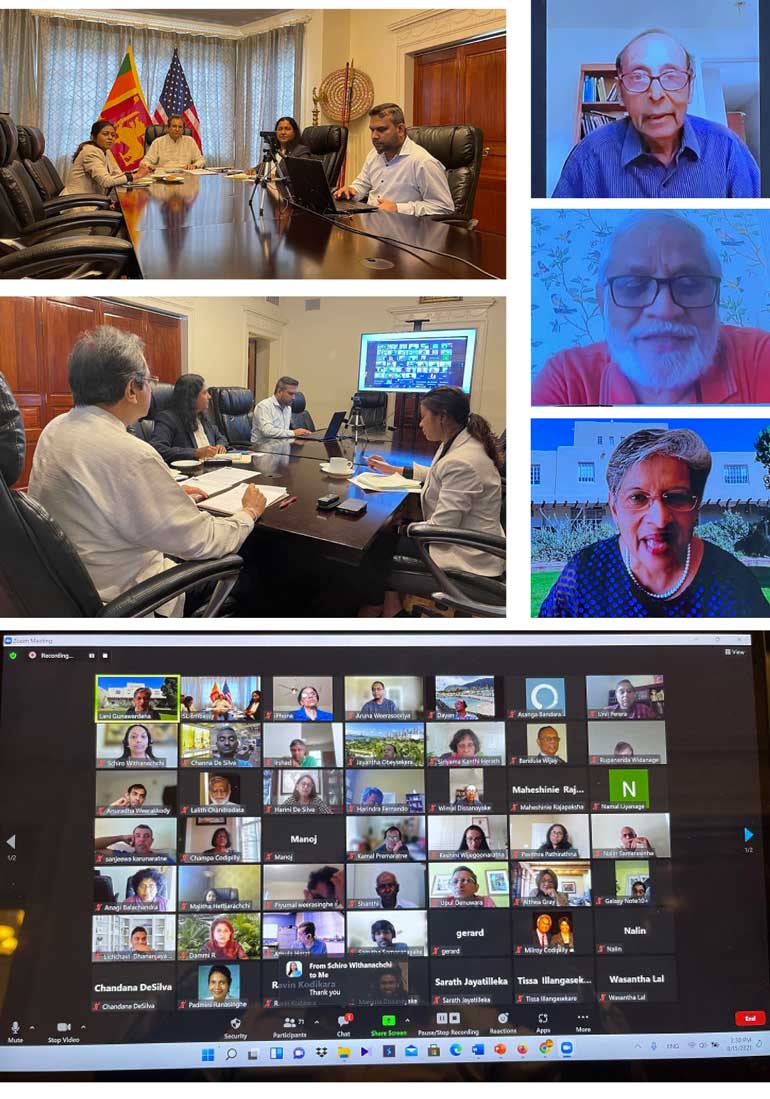Monday Feb 23, 2026
Monday Feb 23, 2026
Monday, 23 August 2021 00:00 - - {{hitsCtrl.values.hits}}

The inaugural meeting of the ‘US-Sri Lanka Academic and Research Collaboration Network’ (USLARCN) was held virtually on 15 August.
The network was launched by the Embassy of Sri Lanka in Washington DC with a view to connecting with the academic community within the US, and leveraging their support towards Sri Lanka in academic collaboration, co-mentoring and facilitating access to US learning resources for Sri Lankan university students.
This further expands the reach of the Pan US Overseas Sri Lankans (OSL) Network launched by the Embassy on 31 January, with the broader aim of supporting OSL activities and leveraging their support towards Embassy efforts at realising the interests of Sri Lanka in the US in political advocacy, economic empowerment, socio-cultural engagement, as well as in bringing unity within the SL community and reaching out to ‘Friends of Sri Lanka’.
Following the response received to a notice which was placed on the Embassy website and circulated among the OSL Network nearly two months ago, over 130 OSLs who expressed interest were clustered into 12 groups in the areas of Cultural Studies and Media; Business and Finance; Early Childhood Education; Team Science and Talent Development; Environmental Studies; Nutrition and Food Science; Chemistry, Physics; Engineering; Computer Science and IT; Medical Sciences;, Social Sciences and Sri Lankan Studies.
Delivering the opening remarks, Ambassador of Sri Lanka to Washington DC Ravinatha Aryasinha commended the significant achievements of Sri Lankan academics in the US and the pride they bring to Sri Lanka. He emphasised the importance of bringing the US-based Sri Lanka origin academic community together, to both support the education system and students living in Sri Lanka, as well as to ensure that those involved at the academic and policy levels in the US had a more nuanced understanding of Sri Lanka, and of Sri Lankans in the US.
Noting that up to the end of the Cold War, institutions such as the East-West Center in Hawaii and a few other US universities had catered to this need, he said that today such a full understanding was imperative so that we respond not only to ‘events’ in each other’s countries but to the related dynamic ‘processes’ as a whole.
Ambassador Aryasinha said that he had during a visit to Hawaii in May 2021, discussed this aspect with both the East-West Center and Asia-Pacific Center for Security Studies (APCSS) so that a better appreciation of the full spectrum of multifaceted relations between Sri Lanka and the US can be better reflected in future collaboration. He hoped that the USLARCN will also take up the challenge to revive this tradition through their individual and collective endeavours.
Ambassador Aryasinha appreciated the support the Embassy received from Prof. Lani Gunawardena and Dr. Menake Piyasena of the New Mexico Node of the OSL Network in coordinating the USLARCN, the Group Leaders for graciously volunteering to lead their groups, and all the other members who are in the network for volunteering their time, energy, passion, and expertise towards this endeavour. He hoped that more likeminded Sri Lankan academics and students in the US would join this endeavour, and that more focused areas would open up for greater collaboration.
Delivering the keynote address on the occasion, Emeritus Professor Wimal Dissanayake of the University of Hawaii and Leader of the Cultural Studies and Media Group, commended Ambassador Aryasinha for the new initiative under the Pan OSL Network, and recalled the different phases of US-SL Education Collaboration since the 1950s. He said that in the past there had been a steady stream of students, journalists, academics, policymakers and service personnel, who have attended long term degree programs as well as seminars, and had benefitted from and contributed to the considerable cross fertilisation of views that took place, significantly around the East-West Center.
However, he noted, “What you have today is a pale shadow of what it was 20 or 30 years ago, but still thanks to the efforts of the Ambassador, I think we are trying to revive it.” Noting that presently Sri Lankan scholars in this network are approximately 80% from the Natural Sciences, 15% from the Social Sciences and 5% from the Humanities, Professor Dissanayake recommended three conceptual criteria that could help future efforts; that it be inter-disciplinary in nature, that it focuses on knowledge exchange and knowledge utilisation, and functions as a ‘Network’ with a structure but also flexibility.
In remarks on the occasion, Consul General of Sri Lanka in Los Angeles Dr. Lalith Chandradasa commended Ambassador Aryasinha’s initiative of earlier launching the OSL Network as a sequel to the USLARCN. He recalled a previous experience where in California, a few experts in the field of pre-schools were linked with Sri Lankan groups through the work of a non-governmental organisation.
Through a series of presentations, each of the 12 Group Leaders elaborated on the goals, objectives, and proposed activities relating to their areas of focus.
Prof. Lani Gunawardena thanked Ambassador Aryasinha for facilitating and encouraging the development of this network across all 50 states and with counterparts in Sri Lanka and observed that during her 40 years in the USA, this was the first time “an ambassador has reached out to all of us in all the states”. She thanked Minister Wijayanthi Edirisinghe at the Embassy who coordinates the OSL Network, for all the support given.
IT officer Kumara Karunarathne and Executive Assistant Koshila Peiris were associated with Ambassador Aryasinha and Minister Edirisinghe at this meeting.